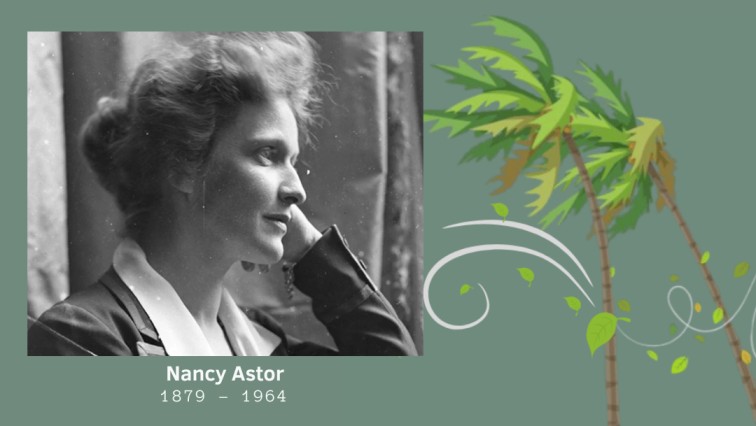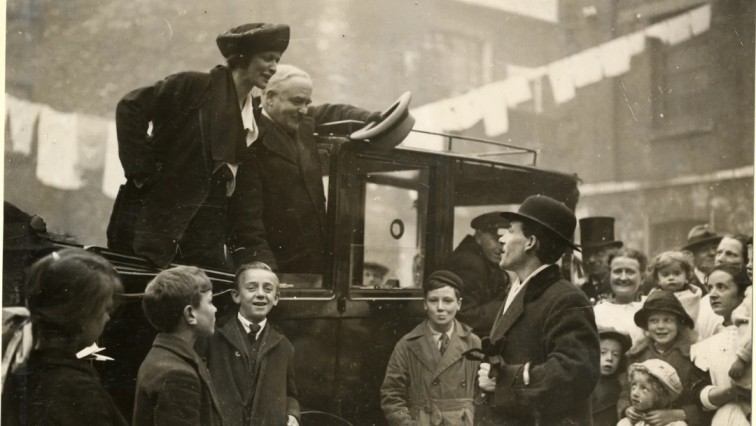
Nancy Astor: A Trailblazer in a Turbulent Era 1879 – 1964
Nancy Astor: A Trailblazer in a Turbulent Era 1879 – 1964 broke political ground as the first woman to sit in the British House of Commons. She entered a male-dominated world with sharp wit, fierce determination, and a drive to reform the society around her.
“Women have got to make the world safe for men, since men have made it so darned unsafe for women.” – Nancy Astor
She was the first woman to take a seat in the British House of Commons and was a force of nature. Born into Southern aristocracy in Virginia, she navigated the complexities of British high society and politics with a rare blend of wit, determination, and social conscience. Her entry into Parliament in 1919 shattered centuries of tradition, challenging the deeply entrenched sexism of the era. Though a Conservative, she championed social reforms that often aligned with progressive ideals, making her a unique and sometimes controversial figure. Her legacy extends beyond her political achievements; she paved the way for future generations of women in politics, proving that women could not only participate but excel in the highest echelons of power.
A Political Timeline of a Turbulent Era
-
- 1879: Born Nancy Witcher Langhorne, amidst a changing American South.
- 1918: The Representation of the People Act grants partial suffrage, setting the stage for her entry into politics.
- 1919: Elected to Parliament shortly after World War I, in a time of social and political upheaval.
- 1920s: Navigated the turbulent post-war era, including the 1926 General Strike, advocating for social reforms.
- 1928: The Equal Franchise Act gave women over 21 the right to vote. She supported this act and actively campaigned for it.
- 1930s: Confronted the economic hardships of the Great Depression and the rising threat of fascism, her support of appeasement created controversy.
- 1939-1945: Witnessed World War II, her relationship with Churchill reaching its most tense point, and saw the changing face of British politics.
- 1945: Retired from Parliament, as the Labour Party took power.
- 1964: Died, leaving a legacy of breaking barriers.
Battles with Titans, Breaking Barriers, and the Strength of Women:
Nancy Astor’s time in Parliament was marked by constant battles against the old guard. She faced relentless prejudice, her contributions often dismissed, and her presence viewed as an unwelcome intrusion. Her sharp wit and refusal to be silenced, however, earned her a reputation as a formidable political figure.

Her clashes with Winston Churchill are legendary. Their verbal sparring matches often provided a dramatic backdrop to parliamentary proceedings. One famous exchange captures their dynamic: when Astor accused Churchill of being drunk, he retorted, “And you, madam, are ugly. But in the morning, I shall be sober.” This anecdote, while humorous, underscores the intense personal and political animosity between them.
She also had to navigate the complex social dynamics of the House of Commons, where established traditions and unspoken rules were designed to exclude women. She was frequently interrupted and ridiculed during her speeches, but she refused to be intimidated. Her campaign was a battleground. She had to contend with heckling crowds, patronizing opponents, and a media that was often dismissive and mocking. Her speeches, however, revealed a sharp intellect and a keen understanding of social issues. She championed causes such as housing reform, child welfare, and temperance, connecting with the concerns of working-class voters.
Astor’s political stance was a fascinating blend of conservatism and social reform. While firmly rooted in the Conservative Party, she was a passionate advocate for social issues that often aligned with progressive or even socialist-leaning policies. This placed her in a unique position, navigating the rising tide of socialist ideals within British politics.
She engaged in debates with Labour MPs, sometimes finding common ground on social issues, other times fiercely defending her Conservative principles. She was not afraid to criticize her own party when she felt they were failing to address social needs, but she also remained a staunch critic of what she perceived as Labour’s radicalism.
Regarding women’s suffrage, while the 1918 Representation of the People Act granted voting rights to some women, Astor actively campaigned for full equality. She supported the 1928 Equal Franchise Act, which granted voting rights to all women over 21, and used her platform to advocate for women’s rights and equality.
Astor had some very strong views on the strengths of women. She said, “Real women require real men.” And also “I married a man who was as jealous of my career as he was of my golf.” These quotes show she was very aware of the obstacles women faced, even in their personal lives.
She also said, “One reason why I like to think of myself as a reformer is that I do believe in reform; in the improvement of the human being. And I am convinced that unless you have women participating in government, you are not going to have reform.” This quote displays her belief in the importance of women in politics.
Her commitment to social justice extended beyond parliamentary debates. She used her platform to advocate for those less fortunate, pushing for improvements in public health and education.
She was a woman who dared to defy expectations, challenging the prevailing social norms and demonstrating that women could be strong, independent, and influential. Her legacy is a reminder of the power of resilience and the importance of challenging the status quo. She pushed the boundaries of what was considered acceptable for a woman in politics, paving the way for future generations. While her views on certain issues, such as appeasement, remain controversial, her commitment to social justice and her courage in the face of adversity are undeniable.





This Post Has 0 Comments